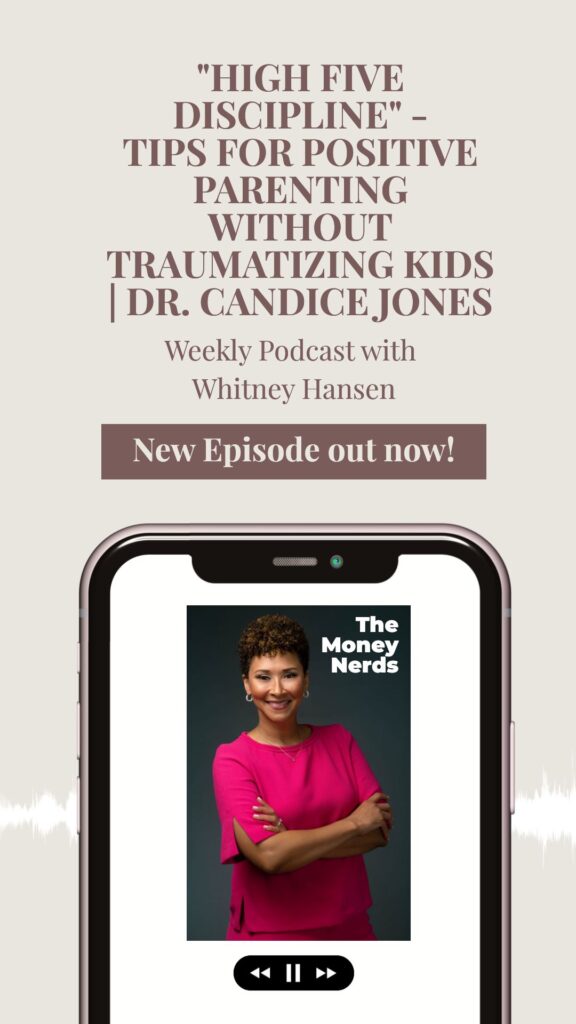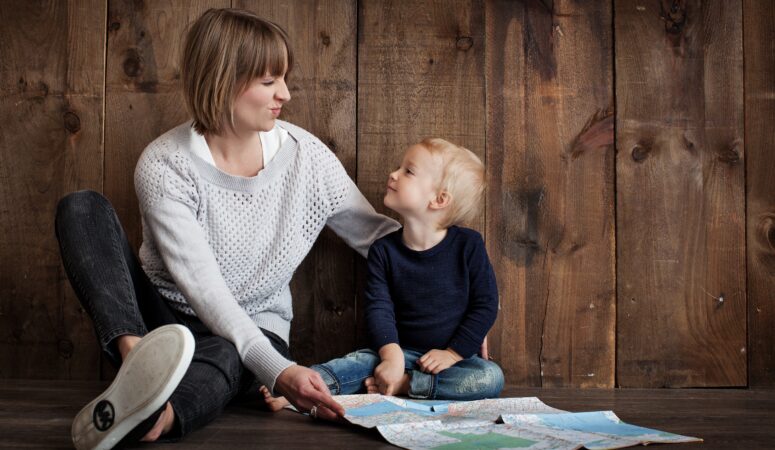Our childhoods have a huge impact on our lives.
They play a big role in shaping our beliefs, choices, and who we are today.
I personally don’t have kids, but I am fascinated with the topic of raising children. I come from a family of six, so it’s inevitable not to be around kids.
Today, I had the privilege of speaking with Dr. Candice Jones, who opened my eyes to healthier ways of disciplining children.
She is an MD FAAP and Board Certified Physician practicing as a general pediatrician in Orlando, Florida. She is committed to the health and well-being of children in areas that are affected by health inequalities. She is the founder of the Kiddin Around podcast, creator of the DrCandiceMD.com website, and author of High Five Discipline: Positive Parenting for Happy, Healthy, Well-Behaved Kids.
We discuss Dr. Candice’s philosophy on positive parenting, why discipline looks different from family to family, the psychology behind physical discipline and its effects on children, the high five essentials, and how discipline integrates into finances.
Dr. Candice’s Philosophy on Positive Parenting
“To disciple means to teach…Positive discipline is a positive parenting approach. It’s a way to raise your children with their growth development in mind. Everything you do in teaching your child is to support their overall growth and well-being.”
Dr. Candice Jones
When giving consequences to your children, ask yourself:
“Is this going to be helpful to them? Is this going to teach them independence within their age group and get them the support they need?” instead of “I’m mad, so I’m going to punish them for it and make them feel what I feel.”
Ask your child, “was that the best thing to do? Was that the best choice? What do you think?”
By doing this, we support our children to problem solve.
One way to positive parent is by following the high five essentials (explained further below).
Why Discipline From Family to Family Will Look Different
Discipline passes down from generation to generation. Sometimes it may be integrated from belief systems.
“For example, in religious upbringings, it’s indoctrination. Our parents did the best they could with what they understood and learned in their childhood. So for those who go by the verse “sparing the rod,” after much further scripture analysis, we can see it’s taken out of context. I know it’s a difficult and sensitive subject for some, and I understand where it comes from.”
Dr. Candice Jones
Many parents have the best intentions for their children. However, they lack the tools and knowledge to do better.
The Psychology Behind Physical Discipline and Its Effects on Children
Spanking is hitting of any type and is a negative, harsher, and physical form of discipline.
According to many years of research and studies, physical discipline has shown adverse effects on children.
When considering what kind of approach to take when raising your children, think about what discipline will yield the best results.
It should be healthy forms of discipline that will create a happy, whole, productive, and kind individual in the long term.
Children raised with physical discipline have been shown to have struggles in relationships, marriage and are more likely to be aggressive. They’ll model what their parents taught them: when you get angry, you can hit.
“The outcomes are not worth that response. It’s not worth it when you know how harmful it is.”
Dr. Candice Jones
There are harmful effects on the brain, like stress hormones that affect the developing brain.
“I don’t want to judge anybody who parents this way nor tell them what to do. I myself was raised with spanking, so I know where it comes from. I’m just here to tell you what research has shown to be the best form of discipline.”
Dr. Candice Jones
The High Five Essentials
These essentials are foundational basics.
Essentially, as a parent, you should individualize your discipline according to the child, but the five basics should always be there.
1. Have a basic knowledge of child development and parenting skills:
•Read some parenting books
•Listen to parenting podcasts
•Look up websites with helpful information (CDC, AAP, and healthychildren.org)
•Utilize your pediatrician by asking many questions and guidance
The next step is to apply skills with the acquired knowledge. That way, you meet your children where they are and not where you want them to be.
“Sometimes we’re disciplining children for something we think they should or shouldn’t be able to do. Often, we punish them for things that are outside the child’s developmental abilities. Take two-year-old tantrums, for example. That is their job because they can’t talk through their emotions. They use their body to express what they’re feeling; it’s a form of communication… We should have the skills to think it’s not personal, but that it’s their developmental phase. We can either choose to redirect, distract, or ignore. If we tell them to be quiet and tell them they aren’t getting what they want, you’re only fueling and escalating the tantrum. You want to regulate the situation. An option could be to bring your child close and hug them until they calm down.”
Dr. Candice Jones
2. Good Relational Health
Having good relational health with your child starts when your child is born.
Bonding, attachment, responsiveness, eye contact, and affection begin in infancy.
When a child feels safe, secure, stable, respected, and loved, they will follow and listen to you more often than not. And even when they don’t, always offer unconditional love.
3. Encouraging Appropriate Behavioral Choices
“Disciple is not reacting to misbehavior, rather its teaching, encouraging, and guiding our kids to make good behavioral choices.”
Dr. Candice Jones
Kids need individualized positive reinforcements. They have to earn praise.
It will encourage them to make positive choices.
4. Discouraging Inappropriate Behaviors and Correcting their Behaviors
“If you’re doing steps 1-3, you won’t have to correct as much behavior. But step 4 is here when it’s needed.”
Dr. Candice Jones
She suggests making fewer punishment-natured decisions and doing more social and emotional learning. Parents do this by helping children understand what they did wrong, helping them express empathy for their actions, and helping them to vocalize what they did was wrong.
Dr. Jones also emphasizes teaching children that they aren’t bad even though they did something wrong. It’s called restoring, and it shows unconditional love.
The social and emotional learning process has to be there with the consequences. It’s important to reframe our minds by replacing the word “punishment” with “consequences.”
Sometimes there are natural consequences that come with your children’s decisions. But other times, the consequences may be taking away some privileges.
It’s as simple as having a very rational conversation with your child.
An example of this could look like this with a teenager:
“Look, I care about your safety. I thought you were responsible enough to drive responsibly. Speeding could lead to a ticket, arrest, or in extreme cases, put your life and others’ lives at risk. Since you proved you’re not ready yet, I’m going to take your keys away right now, and later on, we can discuss whether you’re ready for this privilege.”
5. Managing the Environment: Being Proactive and Not Reactive
To set your children up for success, explain your boundaries and rules beforehand.
And when you explain something, stay consistent with the follow-through.
Plan it all out.
Model what you want your kids to do.
It helps to be mindful and aware to stay calm in difficult situations.
“For me, it helps to take ten and breathe. It’s very important to take care of yourself.”
Dr. Candice Jones
So What Does Discipline Have to Do With Finances?
What we teach our kids will translate in every area of their lives, including money.
It’s so important to teach our children about money. That way, they learn good money habits and will be financially set for the future.
Guide them to make good money decisions and model these decisions as well.
If you would like to listen to today’s podcast episode, click below.
In Conclusion
Disciplining children can be a challenging topic of conversation and, let alone, a tricky thing to do. Dr. Candice Jones explains that research shows the best way to discipline children is by using positive parenting. She understands spanking is a form of discipline passed down from generation to generation but says it isn’t worth the adverse effects on children’s developing brains. Positive parenting can be broken down into five steps: Having a basic knowledge of child development and parenting skills, having good relational health with your children, encouraging appropriate behavioral choices, discouraging inappropriate behaviors and correcting their behaviors, and managing the environment.
Disciplining is important, even when it comes to finances. The money habits you teach your children can either set them up for success or stunt them in their adulthood.
Did any of this resonate with you? I know it did with me. Let me know by reaching out via Instagram or email.
Until next time!

